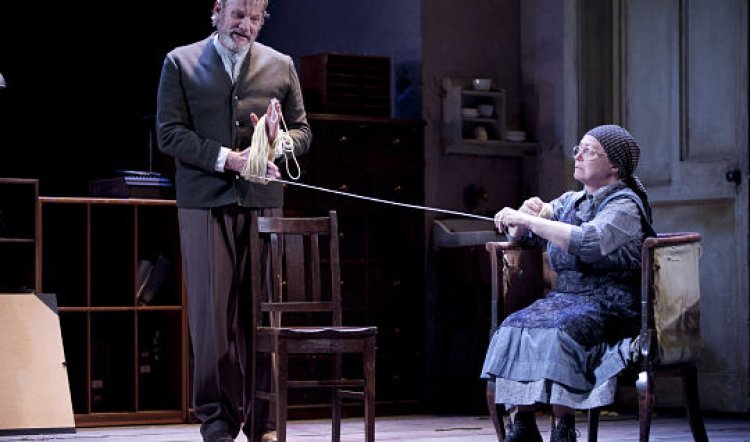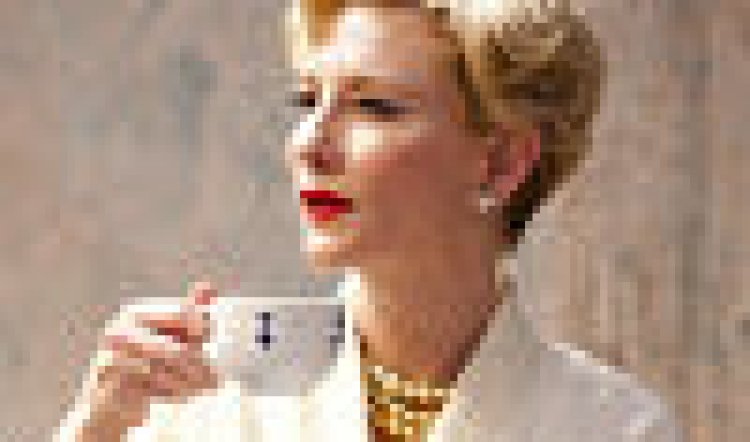
UNCLE VANYA
UNCLE VANYA, Sydney Theatre, Sydney Theatre Company and Bell Shakespeare, 13 November 2010-01 January 2011. Photos: Lisa Tomasetti; above Anthony Phelan and Jacki Weaver: pocket pic: Cate Blanchett.
UNLESS you've been asleep for the past year you'll know that Uncle Vanya is the one to bring together superstar heavyweights Cate Blanchett, Hugo Weaving and Richard Roxburgh as well as John Bell, Jacki Weaver, Sandy Gore, Hayley McElhinney; and Anthony Phelan and Andrew Tighe. To call it "much anticipated" is an understatement and its opening night was therefore one of those curious events where excitement is infectious and the atmosphere at once golden and rosy.
And there are a lot of exciting things about this new version of Anton Chekhov's Uncle Vanya. The first is Andrew Upton's adaptation, which is witty, astute and modern without sacrificing the playwright's poetic tone and vision: it's true to the play and its language (translation by Alex Menglet) but does away with the stiffness so often found in English texts. It gets first mention because the script is the foundation on which the production will be built - it is not yet a production, more a series of glittering jewels waiting to be strung and tied together.
Another excitement is Richard Roxburgh's total immersion in the title role. His Vanya is a complete, credible man whose journey, during the course of the play, from glimmers of hope and the possibility of love, to final awful defeat, is a crushing, sad thing to witness.
On opening night, however, despite those glittering jewels of individual performances, the focus and energy ebbed and flowed. The principals stepped up to deliver their party pieces - almost solo master classes - that dazzled but did not altogether lend themselves to the common purpose. Why this should be is a puzzle, given the strength and depth of talent gathered for the enterprise. Perhaps it has something to do with a director and cast having to communicate entirely through a third party. It seems logical that this arduous process is likely to produce a disjointed outcome: some things must surely be lost in translation. Add to that a clash of cultures and approaches, and limited time to achieve lift-off, and it's probably a miracle that the show is as lucid as it is. I would like to see it again in a couple of weeks when director Tamás Ascher is long gone and the actors have had a chance to mesh their discrete talents into a consistent whole.
Nevertheless, the excitement of the occasion was largely justified in a production whose detail is captivating: blowflies buzz and are flapped away by irritated hands; the heat of late summer in rural Russia is stultifying and palpable, although oddly, a late afternoon is depicted without sunlight from beyond the shutters and rough timber doors. Odd because the set and costumes are fashioned with heightened realism (set Zsolt Khell, costumes Gyorgyi Szakacs, lighting Nick Schlieper) and offer instant clues as to time, place and social status.
The ramshackle estate farmhouse where the equally ramshackle family is gathered is as grotty and neglected as the faithful peasant retainers; and the social chasm between them and the rest of the household is vast and unbridgeable. The annual summer visit by Vanya's brother-in-law, the gouty, self-important intellectual Professor Serebryakov (John Bell elegantly poncing about like a cerebral pouter pigeon) has turned the house upside down; its normal routines are upset, its inhabitants fearful and discombobulated.

Vanya and Sonya, Serebryakov's plain, unloved daughter by his first marriage (painful, intelligent characterisation from Hayley McElhinney) run the farm, living in virtual penury while sending a healthy stipend to the Professor. He is oblivious to their labours, seeing only that the profit is a mere two per cent; selling the place and investing the proceeds in higher yielding bonds would make much more sense, he tells them. Plus ça change.
Somewhat sidelined in this production, rather than being fully active participants from the social periphery, are Vanya's almost addled but still fiercely snobbish mother, who worships the Professor and despises everyone else (splendidly judged silences and spluttered irrelevancies from Sandy Gore). And Marina, the old nurse, traditional keeper of the samovar - a vacuum urn in this 1950s household - is an equally finely drawn woman: watchful, tired but not downtrodden (Jacki Weaver at her restrained, mature, post-Animal Kingdom best). Anthony Phelan is also effective as the ramrod straight, proud but beaten Telegin, a once wealthy landowner.
Then, of course, there's Hugo Weaving who brings a uniquely nimble and playful ennui to Dr Astrov, the physician who also plants trees and desultorily lusts after Yelena (a typically luminous and extraordinary Cate Blanchett). Yelena is the Professor's second and much younger wife-possession. Vanya loves her too and her plight - a butterfly caught between pawing tomcats - is at once grim and hilarious. Her short platinum bob and svelte outfits belie the earthy turmoil and frustration within, while the physical comedy - especially between Astrov and Yelena as they fruitlessly attempt a quickie - is irresistibly funny and real.
There is so much to savour in this Vanya including a lot of laughter and much pity for the hapless victims of provincial pettiness, dreariness and crates of vodka; yet I don't think it's quite right - for the reasons already stated above. A series of priceless, shimmering gems do not make a well-crafted crown and Uncle Vanya should be a crowning achievement for all the actors and the two companies. But I think it still could be, and I suspect it will: I'm going to beg or steal a ticket for later in the season because I want to see what they'll have done with it by then.



